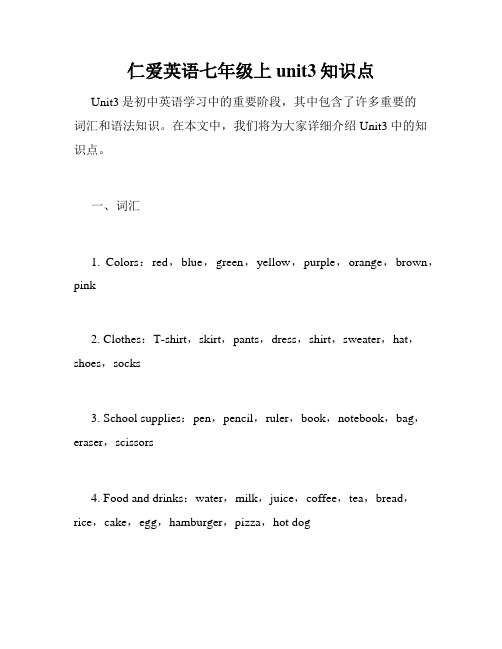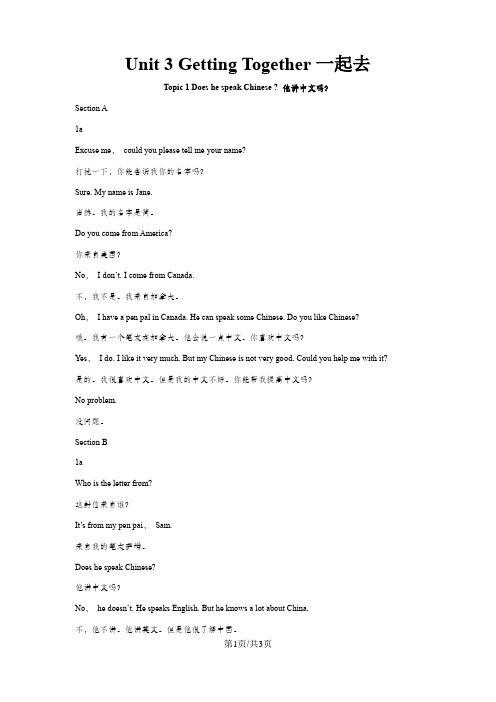仁爱版英语七年级上Unit3Topic3SectionC (1)
仁爱英语七年级上unit3知识点

仁爱英语七年级上unit3知识点Unit3是初中英语学习中的重要阶段,其中包含了许多重要的词汇和语法知识。
在本文中,我们将为大家详细介绍Unit3中的知识点。
一、词汇1. Colors:red,blue,green,yellow,purple,orange,brown,pink2. Clothes:T-shirt,skirt,pants,dress,shirt,sweater,hat,shoes,socks3. School supplies:pen,pencil,ruler,book,notebook,bag,eraser,scissors4. Food and drinks:water,milk,juice,coffee,tea,bread,rice,cake,egg,hamburger,pizza,hot dog5. Family members:father,mother,sister,brother,grandfather,grandmother,uncle,aunt,cousin6. Numbers:one,two,three,four,five,six,seven,eight,nine,ten,eleven,twelve,thirteen,fourteen,fifteen,sixteen,seventeen,eighteen,nineteen,twenty二、语法1. 介词介词是英语中非常重要的语法部分,Unit3中包含了多个常用的介词,如in,on,at,with,to等。
这些介词的正确使用能够帮助我们更加准确地表达自己的意思。
例如:She is sitting on the chair.He is going to the store.The book is in the bag.2. 形容词和副词形容词和副词也是英语语法中的重要部分。
在Unit3中我们学会了很多形容词和副词,如big,small,happy,sad,fast,slow 等等。
Unit3Topic1SectionC课件2022-2023学年仁爱版英语七年级上册

(3)so表示因果,承接关系,意为“因此,所以”。 He comes from America, so his English is very good.
2a Listen, read and learn. A: Jan简e,,d你o y喜ou欢li中ke文C吗hin?ese? B: Ye是s,的I l,ik我e i非t v常er喜y m欢u它ch。. A: What那ab你ou呢t ?y山ou姆, S?am? B: 不No,, I我d一on点't l也ik不e i喜t a欢t a它ll.。
□Jane and Sally are very nice.
□√ We often help each other.
□Jane can speak Chinese very well.
1b Read 1a and circle True or False.
1. Jane, Sally and I are in the same class.
so还可当副词,意为“如此,这么” Its hands is so small.它的手如此小。 She is so beautif
(1)and意为“和;又;并”,表示并列关系,用来连接语法作用相同的 词、短语或句子。如: I'm from Beijing and she is from Shanghai.我来自北京,她来自上海。
他来自美国,所以他英语很好。
Language points
用and,but,so填空 1.I like English __a_n_d___ Chinese. 2.I want to buy a pair of new shoes _b__u_t_ I don’t have enough money. (足够的钱). 3.I often help my classmates ___so__ they think I’m a good student. 4.I’m a Chinese __a_n_d_ she is an American. 5.He likes English very much __b_u_t_ his English is not very good. 6.She likes English a lot __s_o___ she studies hard(努力学习) every day.
仁爱初中英语七年级上册《Unit 3Topic 1 Does he speak ChineseC》精品教案 (3)

Topic 1 Does he speak ChineseSection CI. Material analysis本节课是本话题的第三课时,主要活动是1a和2a。
通过介绍“我”的两个同学Jane和Sally,进一步学习和巩固表示喜好的表达法、实义动词第三人称单数的一般现在时的陈述句、一般疑问句及肯定、否定回答以及人称代词的主格和宾格的用法。
同时,通过匹配图片和音标,帮助理解单词意义,并根据音标拼写单词,再现和巩固了Section A中的音标教学,巩固了字母和字母组合ar,er,ir,o,ee,ch,sh等在单词中的发音规律,帮助学生尝试结合发音规律拼读新单词。
II. Teaching aims1. Knowledge aims能根据已学语音、音标及发音规则,正确朗读下列词汇并运用于情景对话中: many, little, a little, so, them, each, each other, all, not ... at all;能在Section A的语法基础上正确运用come, speak, like, help等实义动词第三人称单数的一般现在时的陈述句、特殊疑问句、一般疑问句及其肯定否定回答,同时巩固人称代词的主格和宾格的用法;能在Section A已学的语音基础上结合图片和音标拼写单词,并能尝试结合语音发音规律拼读新单词;ar /3/ : march, farmer er /ə/: farmer, sisterir /8/ : first, bird, shirt o /4/ /əK/: go, orangeee /1/ : see ch /C/ : China, Chineses h /H/ : fish, shirt, ship能结合话题,运用“谈论喜好、朋友”等交际功能的基本表达形式,进行口头和笔头的信息输出,如:Where does he come from?Does he like Chinese?2. Skill aims能听懂有关表达谈论喜好的叙述与对话;能根据图文就谈论喜好等话题进行交流,能结合字母及字母组合的音标规律拼读新单词;能在阅读训练中进行读前猜测、读中验证的活动;能理解并执行有关“谈论笔友”的书面指令并形成短文。
2015秋仁爱版英语七年级上Unit3 Topic3 What would you like to drink语言知识点

Unit3 Topic 3:What would you like to drink?Section A1. Help yourselves! 请随便(吃/喝)!若是两人或两人以上,用Help yourselves!Help yourself to ……“请随便吃/喝…….”。
( ) Help _____ some apples ,please.A. yourself ofB. yourself for C . yourself to2.Would you like some eggs, Maria?玛利亚,你想吃一些鸡蛋吗?Some 意为“一些”,常用在肯定句中,也可以用在表示请求的疑问句中,含有希望得到肯定回答的意思。
Some既可以修饰可数名词复数,也可以修饰不可数名词。
( )1. --- Would you like _____ apples? --- No, thanks.A. aB. an C . any D. some( )2. --- What about _____ fish? --- Good idea.A. manyB. a C . some D. Any( )3. --Some water for me,please. ---Me , ____A. andB. also C .too3. Would like 意思是“要;想要”用于礼貌地表达愿望,相当于want 。
如:I would like some apples.=== I want some apples.它构成的句子有:(1)“Would you like sth?” 表示“你想要某物吗?”—Would you like a cup of tea? —Yes,please./No,thanks.(2)Would you like to do sth? 表示“你想要做某事吗?”如:--- Would you like to take some cakes to the party?---- Yes,I’d like to. / Sorry ,I can’t. / I’d like to , but………( )1.---Would you like some fish? ---____A. No,thanksB. Give you . C .Sorry ,I can’t.( )2.---what about some apple juice ? ---___A. Why not?B. Yes C No . D ,Good idea4.What would you like to have? 你想吃/喝什么?have 意为“吃,喝”,也意为“拥有”( ) --- What would you like to have? --- Id like to some juice and some bread.A.haveB.eat C .help D.drink5.I’d like some rice and chicken. 我想要一些米饭和鸡肉。
仁爱版七年级上册英语笔记Unit3Topic3-Unit4Topic1知识点总结

仁爱版七年级上册英语笔记Unit3Topic3-Unit4Topic1知识点总结U 3 T3—U4 T11.1)would like = wantwould like没有人称和数的变化I would like an egg.=I want an egg.He would like an egg.= He wants an egg.(would like不能加s)2)would like to do = want to doa. He would like to drink some water.(drink)=He wants to drink some water.b. She would like (visit) the Great Wall.=She the Great Wall.3)I would like=I’d like He would like=He’d like4)a. I’d like an egg.(一般疑问句) Would you like an egg?Yes,please./ No,thanks.b. He’d like a hamburger.he a hamburger?. / .5)Would you like some chicken?(用some 加强语气,表示强调)6)I’d like an egg.What would you like?He’d like some fish.he ?2.1)you—yourself(反身代词)2)yoursel f---yoursel ves(pl.)3.help yourself/yourselves to +n.:随便吃……a. Help yourself (you) to some chicken, Tom.b. Help yourselves (you) to some chicken, kids.4.1)可数名词[C]:有单数和复数的形式.2)不可数名词[UC]:一般没有复数的形式.3)常见的不可数名词有:milk,rice,fish(鱼肉),chicken(鸡肉),(apple/orange) juice,water,bread5.fish:1)作为“鱼” , 是可数名词.fish—fish(pl.)2)作为“鱼肉”, 是不可数名词.some fish6.chicken:1)作为“鸡” , 是可数名词.a chicken2)作为“鸡肉”, 是不可数名词.some chicken7.some + n.(pl.),some+ [UC]some eggssome fish/chicken/milk/apple juice/rice8.---Help yourselves.---Thank you.9.---Would you like…? ---Yes, please. /No, thanks.10.What/How about +sb(宾格)/sth?What about him/her/some milk?11.All right.行,好吧(表示对别人的建议表示赞同)---I’d like some rice and chicken.---All right./doc/6e6981861.html,k for me.13.Me,too.14.表示建议:---What about …? ---Good idea.15.an ideaa good ideaHomework:1.I’d like a hamburger.(一般疑问句) a hamburger?(肯否回答) ./ .2.She’d like some orange juice.she ?3. , boys and girls.(随便吃些鸡肉吧)4.She likes it very much.(否)She it .5..(我想喝些牛奶).6.他们怎么样?Unit 3 T 3 Section B—D1.1)usually:70-80%,often:50-60%2)usually,often放在be之后,行为动词之前.I usually have breakfast at home.2.have…for breakfast/lunch/supper/dinner1)He usually has an egg and some milk for breakfast.2)We usually have some rice and chicken for supper.3.一日三餐前不加a/an/the,后不加s.What do you usually have for/ breakfast?4.1)He usually has some bread for lunch.What does he usually have for lunch?2)We usually have some juice and fish for dinner. usuallyfor dinner?5.have:1)有2)吃,喝:have milk/bread6.[UC]前面不加a/an/the,后不加s.He has / milk and/ bread for breakfast.7.What/How about +sb(宾格)/sth?8.with带着/有,(表示伴随关系)have chicken/fish with vegetables9.some rice10.three meals(餐):breakfast,lunch,supper/dinner11.food:[UC],食物的总称,作主语,谓语用单数.My favorite food is (be) chicken and fish.12.Chinese /English food13.wait(v.)—waiter(指人)(男服务员)---waitress(女服务员)14.take one’s orderMay I take your order?15.something to drink/eat1)修饰词如不定式(to do) ,形容词修饰something时,放在something之后.2)something:某事(肯定句)anything:任何事(否/疑问)nothing:没有什么事(表否定意思的陈述句)3)Would you like +something?Would you likesomething to eat ?16.[UC]表示数量的表达法:1)a glass of apple juice/watera bag of rice /milk2)a glass of apple juice---two/some glasses of apple juice3) a bag of milk---five bags of milk17.wait/just a moment18.Let me see.让我想一想.I see. 我明白了.19.1)Would you like some vegetables?2)some vegetables/rice20.something to drink21.banana juice----Section C1.eat out2.eat---eating(现在分词)3.would like to doWould you like to have (have) dinner with me?4.have / breakfast/lunch/supper/dinner5.with sb(宾格)6.Would you like to have lunch with him?7.Yes, I’d like/love to.(to不能省略)8.1)May/can I help you?=What can I do for you?2)情态动词may/can/could+动原May I help (help) you?9.sir—madam(对应词)10.What would you liketo eat (eat)?11.Why not+动原? =Why don’t you +动原?Why not study (study) with me? = Why don’t you study with me?12.表示建议:1)What about…? 2)Why not…?肯定回答:Good idea.13.Here you are.14.---Would you like sth to drink?---Yes,please./No,thanks.Section D1.in+地点: in China2.many+n(pl.)many friends3.1)all,bothall指三者或三者以上“都”both指两者“都”2)all,both放在be之后,行为动词之前They are all students.We all like school.4.be kind to sbThe teacher is kind to us.5.have dinner with them6.such as +若干例子7.Sichuan food8.be glad to do sthObama is glad to visit (visit) the Great Wall.9.1)here,there是介词,前不加介词.2)be here/thereI’m glad to be (be) here.10.let sb do sthLet me (I) see (see).Homework:1.他晚饭通常吃什么?he usually2.你可以点菜了吗?3.Tom,为什么不随便吃些汉堡包呢,?,Tom?4.你想喝些什么东西吗?来两杯香蕉汁. Would you like.5.She’s glad (be) there.6.I’d like (work) with you.7.Would you like something (say)?8.Why not (tell) him about it.= him about it.9.他对我很友善.He .10.I usually have some rice for lunch. usually for lunch?1.---Do you like…?---Yes, I like …very much/a lot/a little. (No, I don’t like …at all.)Section D1.at / homeHe has a dog at home.2.it’s, its(它是)(它的)a cat. name’s Mimi.3.Tommy =T om4.Zhou Lan likes it a lot.= Zhou Lan likes it very much. (否)Zhou Lan doesn’t li ke it at all.5.some,anyShe has some pets.(否)She doesn’t have any pets.(疑问)Does she have any pets?6.1)人称代词:主格---宾格I—me,you-you,he-him,she-her,it-itwe-us,they-them2)形物代—名物代my-mine,your-yours,his-his,her-hers,its-its,our-ours,their-theirsThis is a girl. name is Lily. is twelve. We like .(Her,She,her) Unit 4 T1 Section A1.What can I do for you?=Can/May I help you?2.madam---sir(对应词)3.want to do = would like to do1)She wants to have milk and bread.=She would like to have milk and bread.2)Would you like a glass of apple juice?=Do you want a glass of apple juice?3)Would she like some vegetables?=Does she want any vegetables?4.clothes:衣服的总称,复数名词,作主语时,谓语用复数形式。
仁爱版英语 七年级上册 Unit 3 Topic 1 课文及翻译

Unit 3 Getting Together一起去Topic 1 Does he speak Chinese ? 他讲中文吗?Section A1aExcuse me,could you please tell me your name?打扰一下,你能告诉我你的名字吗?Sure. My name is Jane.当然。
我的名字是简。
Do you come from America?你来自美国?No,I don’t. I come from Canada.不,我不是。
我来自加拿大。
Oh,I have a pen pal in Canada. He can speak some Chinese. Do you like Chinese?哦。
我有一个笔友在加拿大。
他会说一点中文。
你喜欢中文吗?Yes,I do. I like it very much. But my Chinese is not very good. Could you help me with it?是的。
我很喜欢中文。
但是我的中文不好。
你能帮我提高中文吗?No problem.没问题。
Section B1aWho is the letter from?这封信来自谁?It’s from my pen pai,Sam.来自我的笔友萨姆。
Does he speak Chinese?他讲中文吗?No,he doesn’t. He speaks English. But he knows a lot about China.不,他不讲。
他讲英文。
但是他很了解中国。
Does he live in England?他住在英格兰?Yes,he does.是的。
What does he say in the letter?他在信里说了什么?He wants to visit Beijing.他想浏览北京。
Oh,he can help you with your English.哦。
仁爱版七年级上册英语教学设计:Unit 3 Topic3 Section C

导入——①呈现歌曲,活跃气氛,同是让学生感知发音。复习本话题Section A的4a的音标,然后完成本课的4a。
②复习上节课的句型,让学生两人一组自编自演在餐馆就餐的情景,表演
③复习“What would you like for breakfast/lunch/supper?”,“I'd like ...”
Words and phrases:
Eat out why
Key sentences
(1)—Would you like to have dinner with me?—Yes, I’d like to.
(2)—What would you like to eat?—Let me see.
(3)—Why not have some fish and eggs?—Good idea!
教学目标
1.grasp the words and phrases:eat out why
2.能熟练地使用“在饭店点餐”、“用餐与服务员对话”、以及“用餐时表达建议”的句子进行交流与运用,如:
(1)—Would you like to have dinner with me?—Yes, I’d like to.
(4)—Help yourself to some fish.—Thanks.
(5)Here you are.
教学反思及作业反馈:
(1)存在问题:
(2)解决办法:
“ar”:“ai”,“ay”:
5.培养学生学习英语的兴趣和积极主动的学习精神;使学生乐于接触并了解中西方餐饮习惯的差别,同时养成健康的饮食习惯。
教学重点难点:
1.学生能在情景对话中,熟练运用点餐、就餐及表达建议的表达法。
仁爱版七年级英语上册Unit3Topic3WhatwouldyouliketodrinkC优质教案(2)

课题:Topic3Whatwouldyouliketodrink?SectionC第1课时一、导学目标1、复习SectionB的重要句型2、学习重要句型1)Wouldyouliketohavedinnerwithme?2)Whatwouldyouliketodrink?3)Helpyourse4)Whynotdo…?句型【阅读质疑合作探究】一)课前预习本课新单词,并自我检测:吃__________在外面___________下馆子__________吃正餐__________随便吃些鱼___________为什么不_______________一些喝的东西___________让我想想_______________在餐馆_______________二)走入新课1、熟读1a对话.注意文中MayIhelpyou,sir?这句话的使用情景2、自主完成课本P75页1b和P76页2、3、4a/4b.二、精讲点拨①letsb.dosth..让某人做某事。
e.g.Letmehelpyou.②Whynot+动词原形…….?用来提出建议或表示责备。
也可以变成Whydon’tyou+动词原形…….?e.g.Whydon’tyouhavesomejuice?注意:在whynotdosth.?=whydon’tyoudosth.?这两个句型中,因都表示建议、请求等委婉语气,故含有some时不能换成any.【多元互动合作探究】1、Heworkson a farm.(对划线部分提问)he ?2、I’dlikesome apples.(同上)like?3、Wouldyouliketodrinksomewater.(做否定回答)No,4、I’dlikesomecakes.(改为一般疑问句)you cakes?5、Whydon’tyouhavesomefish?(改为同义句)Why havesomefish?6、Janelikesapples.(对划线部分提问)_____________Jane_______?【训练检测目标探究】A.根据句意及首字母提示填词。
仁爱版七年级英语(上)第3单元全部知识点

Unit 3 Getting TogetherTopic 1 Do you like English?Section A一、重要语句:(1)Could you please …? → (2)Sure.(3)Do you like English? → (4)Yes, I do./ No,I don’t.(5)Could you help me with my …? →(6)No problem.二、语法知识:1. speak 讲、说(某种语言)E.g. He can speak English .2. Could you please+动词原形?你能......吗?(表请求)E.g. Could you please tell me your name?3. Sure. / Of course. / No problem. 好的,没有问题。
Sorry.不好意思,不行。
4. help sb. with sth./(to) do sth.E.g. I often help Jane with her Chinese. 我经常帮助Jane学习汉语。
I often help Jane study Chinese. 我经常帮助Jane学习汉语。
5. tell sb. sth.告诉某人某事E.g. Please tell him I am very well .6. come from=be fromE.g. They come from England .They are from England.7.在英语句子中,如果主语是第三人称单数,那么在动词后加-SE.g. You like English . He likes English .变为疑问句和否定句时,加does并把动词改为原型:E.g. He does not like English . Does he like English ?8. like 可以作动词,意思是喜欢。
仁爱版英语七年级上Unit3Topic3SectionC

Unit 3 Topic 3What would you like to drink?福建泉州晋江罗山中学王淑春(影片1)May I take your order, sir?两人一组自编自演在餐馆就餐的情景。
下面的食物供你参考。
May I help you, sir?for breakfast?I 'd like milk and breadfor breakfast.for lunch?I 'd like fish and ricefor lunch.for supper/dinner?I 'd like chicken and jiaozifor supper/dinner.What do you usually have for lunch? ...Where do you often have dinner? ...Do you often eat out?...Why not eat out?/What about eating out? ...OK. Let's eat out for dinner.(影片2)Would you like to …May I help you?What would you like to eat? Why not …?Help yourself to …()Here you are.(1 )May I help you , sir?()Ok. 16 yuan , please.()Yes ,two hamburgers, please.()No , thanks .()Would you like something to drink?23456Put the followingsentences in thecorrect order tomake a conversation.My name is Huang Ying. My favorite food is _____. I like _______and ____________ very much.I like ______. I like_____________ and ________ alittle. I don't like___________. I don’t like ________at all.chicken rice orange juice apple juice milk bananas fish hamburgers Look at the pictures andcomplete the passage.•邀请你的一位朋友去餐馆就餐。
Unit3Topic3SectionC课件2022-2023学年仁爱版英语七年级上册

4. Would you like some jiaozi? 4. e, f 5. Why not have some fish 5. e, f
and eggs? 6. What would you like to drink? 6. a
a. A glass of apple juice, please.
THANKS
①Why not/Why don’t you +V原...? 为什不……? ②How/What about+名词/动词ing …? ...怎么样? ③Would you like (to do) ... 你想要(做)...?
1. 如果你是餐馆服务员
(1) 客人来了,你说什么?
May I help you? 我能帮你吗?
b. Good idea. I like vegetables very much.
c. Rice and fish, please. d. I often have bread and
milk for breakfast. e. No, thanks. I'd like
some rice. f. Good idea.
(3) 让朋友随便吃elves to ... 请随便吃…
(一) 选一选
1. --Would you like to have dinner with me ?
--_______ .
A. Yes , please .
B. Yes, I'd love to.
What would you like to drink?
Task 1.Look at the pictures and guess the title of the passage.
七年级英语Unit 3 Topic 3 Would you like something to drink 仁爱版知识精讲

七年级英语Unit 3 Topic 3 Would you like something to drink?仁爱版【本讲教育信息】一. 教学内容:Unit 3 Good Friends. Topic 3 Would you like something to drink?二. 教学重难点:单词:句子讲解:金点剖析:[金点1]Help yourself. 请随便(吃)。
help oneself to…是招待客人常用的交际用语,意思是“请随便吃/用……”。
当有一位客人时,用yourself;多位客人时,用yourselves。
如:Help yourself to some bananas. 请吃些香蕉吧。
Help yourself to some juice. 请随便喝果汁。
Help yourselves to some pizza. 请吃些比萨饼吧。
即时演练:用oneself的适当形式填空1. Help ___________ to some chicken, kids.2. Help ___________ to some juice, Jane.[金点2]I’d like some chicken. 我想吃一些鸡肉。
I’d like是I would like的简写形式,意为“想要……,愿意……”,常用来婉转地表示请求以及征求对方的意见,相当于want,但比want更委婉。
(1)would like后面跟名词或代词。
如:I’d like a cup of tea. = I want a cup of tea. 我想喝一杯茶。
Would you like something to eat? 你想吃点东西吗?(2)would like后跟动词时,用动词不定式形式。
如:I’d like to do some shopping after school. 放学后我想去买东西。
Would you like to come to my home for supper? 你愿意到我家来吃晚饭吗?(3)would like sb. to do sth. 表示“想要某人做某事”。
福建仁爱英语七年级上Unit 3 Topic 3 Section C 堂堂清

福建仁爱英语七年级上Unit 3 Topic 3 Section C 堂堂清I.选词填空1.---Would you like to have dinner _______(and\ with)me?---Yes, I'd like to.2.Help _____________to some fish, boys and girls. (yourselves\ yourself).3. I would like to drink some__________(orange\oranges).4.----What would you like to _________(eat\drink)?----A glass of milk, thank you.5.Let ___________( me\I)see.6. Why _________(no\ not)have some fish and eggs?7. Hi, Maria. Help ________ (yourself) to some chicken.8. What do you usually have _______(for\to) breakfast.9. Would you like to have dinner ________(and\with) me?10. ---What would you like to__________(drink\eat).----Some apple juice, please.II.单选题。
()1. —What would you like to _______?—Rice and fish.A. eatB. haveC. drink()2.---- Why not________some banana juice?----Good idea.A. to drinkB. drinkingC. drink()3.—Would you like to have some chicken?—Yes, __________A. I’d love toB. I would likeC. sorry()4. He would like_________ some juice.A. drinkB. drinksC. to have()5. These are two ________ of milk.A. glassB. glassesC. glasss()6.Tom likes _______ very much.A. ricesB. breadC. vegetable()7. ----________________----Yes, I’d like some rice and chicken.A. May I help you?B. What would you like?C. Would you like some bread and juice?()8.----Would you like something to drink?-----Yes, five glasses of__________.A. orangeB. orange juicesC. oranges()9.--- Would you like to have some chicken?---________ I’d like some fish.A. No, thanksB. Yes, pleaseC. Sure()10.---- What about some bread and milk?----___________.A. Yes, I would like to.B. Good ideaC. Thank youIII. 情景交际题1.假如你是餐馆服务员,有客人来了你会怎么问:May_______________________________________?2. 你想知道对方想吃什么。
仁爱版七年级英语上册Unit3Topic3WhatwouldyouliketodrinkB优质教案(4)

Topic3WhatwouldyouliketodrinkSectionBI.Materialanalysis本课是第三单元话题三的第二课时,主要活动是1a和3a。
通过康康和迈克尔之间的对话,在复习和巩固关于食物和饮料的词汇的同时,学习谈论一日三餐饮食习惯的用语。
此外,通过看图完成对话,学习顾客在饭店点餐时和服务员对话的常用语。
本课的主要句型有:“Whatdoyouusuallyhaveforbreakfast,Michael?”,“MayItakeyourorder,sir?”等。
在本课中,生词量不多,因此教师应该在SectionA已有的词汇基础上创设情景,让学生在情景对话中自然感知并熟练掌握关于一日三餐饮食习惯及饭店点餐的用语。
II.Teachingaims1.Knowledgeaims能根据已学语音、音标及发音规则,正确朗读下列词汇并在实际的情景对话操练中加以应用:usually,breakfast,lunch,dinner,food,may,take,order ,sir,something,glass,mm;能在情景对话中就一日三餐的饮食习惯及在饭店点餐与服务员对话这两个话题进行交流,如:(1)—Whatdoyouusuallyhaveforbreakfast,Michael?—Iusuallyhavemilkandbreadforbreakfast.(2)—MayItakeyourorder,sir?—Somefishwithvegetablesandabowlofrice,please.在教师的帮助与指引下,通过对话操练、听力训练等活动,能掌握for+breakfast/lunch/dinner的用法。
2.Skillaims能听懂有关一日三餐饮食习惯及饭店点餐等的简单对话;能就一日三餐饮食习惯及饭店点餐话题进行交流;能正确朗读对话,注意语音语调;跟根据图文理解有关就餐的对话与小短文,并根据要求进行学习活动;能根据图文完成有关就餐的对话填空。
仁爱版七年级英语上册 Unit 3 Topic 3 Section C 课件

Let sb do sth“让某人做某事”
eg: Let me help you.
Let’s go.
4. Why not +动词原形…? 为什么不……?
= Why don’t you +动词原形…? 用来向对方提供建议。
如:Why not buy this coat? = Why don’t you buy this coat?
Help oneself to … 请某人随便吃些…(注意反身代词的用法)。
Example:
Maria, help yourself to some juice! Girls, help yourselves to some cakes.
Watch the flash of 1a, then act it out.
Grammar
Key points in 1a:
1. eat out 外出就餐 ;
eat in “在家吃”;
eat up意为“吃完”
2. May I help you? = What can I do for you?
你需要点什么?/我能帮你吗? 在不同场合有不同含义, 商店: 你要买什么? 酒吧: 你想要喝什么? 餐馆:你想要点什么?此时=May I take your order?
2.The man in green doesn’t like fish or eggs. ( ) F
Read 1a and Understand
A: Would you like to have dinner with me? B: Yes, I'd like to. C: May I help you, sir? A: Yes. What would you like to eat? B: Let me see. A: Why not have some fish and eggs? B: Good idea! A: Help yourself to some fish. Here you are. C: Thanks. A: Would you like something to drink? C: No, thanks.
仁爱版七年级英语上册Unit3Topic3WhatwouldyouliketodrinkD优质教案(3)

Topic3WhatwouldyouliketodrinkSectionDI.Materialanalysis本课是第三话题的最后一个课时,主要活动是Grammar,Functions和1。
通过让学生自行复习SectionsA-C的名词并按照可数与不可数进行归类,再现和巩固本话题所学过的关于食物与饮料的名词;此外,通过情景对话表演,学生再次操练和巩固本话题所学过的关于饮食习惯、一日三餐、饭店点餐、用餐、表达建议等的用法,同时锻炼和提高学生的口语水平。
在本课的任务设计中,学生将通过阅读Jane写给Jack的信件,了解并学习英文书信的书写格式,拓展他们的文化视野,并尝试用英语给自己的朋友写信,锻炼学生的写作能力和语言的综合运用输出能力。
综合探究活动将通过小组调查与情景表演的形式,让学生积极运用本话题所学过的知识,学会用英语做事,培养学生的综合语言运用能力。
II.Teachingaims1.Knowledgeaims引导学生复习SectionA~C所学的饮食名称的相关词汇,如蔬菜、饮料等,并正确朗读下列词汇并在实际的情景对话操练中加以应用:d ear,kind,be;引导学生在情景对话及小组表演中复习、归纳“点餐”、“用餐”、“饮食习惯”以及“表达建议”的用法并进行交流,如:Wouldyoulikesomethingto...?Whatwouldyouliketoeat/drink?Whynothavesome...?Whatdoyouusuallyhavefor...?Helpyourself/yourselvestosome...Hereyouare.在教师的帮助与指引下,结合已学知识,能区分并辨别可数名词和不可数名词,并掌握其一般用法;能结合课堂活动,掌握含有wouldlike表达就餐意愿的表达法。
2.Skillaims能听懂课堂上简单的课堂用语并做出适当的反应;能就饮食习惯进行交流并会使用常用的就餐用语;能在口头表达中做到发音清晰,语音语调准确;能正确朗读对话,注意语音语调;能阅读书信内容并完成填空;能写出食物和饮料名词并按可数与不可数进行分类;能根据图文编写有关就餐的对话与文章。
仁爱版英语 七年级上册 Unit 3 Topic 3 课文及翻译

Unit 3 Getting Together一起去Topic 3 What would you like to drink? 你想喝点什么?Section A1aHelp yourselves!随便吃!Thank you. I would like an egg and some fish.谢谢!我想要一个鸡蛋和一些鱼肉。
Would you like some eggs,Maria?玛丽娜,你想要些鸡蛋吗?No,thanks. I’d like some chicken.不,谢谢!我想要些鸡肉。
What about you,Jane?简,你呢?Rice and chicken,please.米饭和鸡肉。
All right. What would you like to drink?好的。
你们想要喝点什么?Apple juice,please. I like it very much.苹果汁。
我很喜欢它。
Milk for me,please.我要牛奶。
Me,too. 我也是。
Section B1aWhat do you usually have for breakfast,Micheal?迈克,你经常早餐吃什么?I usually have milk and bread for breakfast.我经常早餐喝牛奶吃面包。
What about you ?你呢?I usually have chicken with vegetables and some rice.我经常吃蔬菜加鸡肉和一些米饭。
And dinner?那晚餐呢?Jiaozi. It’s my favorite food. I like Chinese food very much.饺子。
它是我最喜欢的食物。
我非常喜欢中国食物。
Section C1a1Would you like to have dinner with me?你愿意和我一起共进晚餐吗?Yes,I’d like to.很乐意。
仁爱版英语七年级上册Unit1Topic3SectionC教学设计

注意事项:
1.作业量适中,避免给学生造成过重的负担。
2.鼓励学生主动完成作业,培养他们的自主学习能力。
3.家长应关注学生的作业完成情况,并及时与教师沟通,共同解决学生在学习过程中遇到的问题。
4.教师在批改作业时,要关注学生的个体差异,给予针对性的评价和指导。
2.能够运用一般疑问句和特殊疑问句进行简单的日常交流,如:How are you? How old are you? What's your name? Where are you from?等。
3.能够运用所学词汇和句型进行自我介绍和询问他人的基本信息。
4.能够正确使用动词的现在时态进行简单的句子构建。
五、作业布置
为了巩固仁爱版英语七年级上册Unit1 Topic3 Section C所学的知识,确保学生对本节课内容的掌握,特布置以下作业:
1.写作作业:根据本节课所学的词汇和句型,编写一篇简短的英文对话,内容要求包括自我介绍和问候他人。要求学生注意使用正确的时态和语法结构,字数在50-80词左右。
d.写作训练:根据所学词汇和句型,让学生完成一篇简短的作文,巩固写作能力。
(五)总结归纳
1.教学活动:对本节课所学内容进行总结归纳。
2.教学设计:通过提问、复述等方式,帮助学生巩固所学知识,强调重点和难点。
3.教师总结:对本节课的重点词汇、句型以及语法知识点进行梳理,提醒学生注意课后复习。
4.布置作业:根据本节课所学内容,布置相应的课后作业,巩固所学知识。
2.重点:培养学生听力、口语、阅读和写作四项基本技能。
难点:提高学生在实际情境中的语言运用能力,尤其是口语表达和写作能力。
- 1、下载文档前请自行甄别文档内容的完整性,平台不提供额外的编辑、内容补充、找答案等附加服务。
- 2、"仅部分预览"的文档,不可在线预览部分如存在完整性等问题,可反馈申请退款(可完整预览的文档不适用该条件!)。
- 3、如文档侵犯您的权益,请联系客服反馈,我们会尽快为您处理(人工客服工作时间:9:00-18:30)。
• 邀请你的一位朋友去餐馆就餐。可以把你的课桌 当饭桌,应分三个步骤: • (1)首先邀请别人吃饭; • (2)到餐馆后点菜; • (3)吃饭的过程。 • 运用以下句型: Would you like to have ... with me? May I take your order/May I help you? What would you like to eat/have? Why not ...?/What about ...? Would you like something to drink/ eat/have?
Unit 3 Topic 3
What would you like to drink?
(影片1)
May I take your order, sir?
两人一组自编自演在 餐馆就餐的情景。下 面的食物供你参考。
May I help you, sir?
What would you like for breakfast?
I 'd like milk and bread for breakfast.
What would you like for lunch?
I 'd like fish and rice for lunch.
What would you like for supper/dinner?
I 'd like chicken and jiaozi for supper/dinner.
Useful expressions:
☆ May
I help you? ☆ Help yourself to … ☆ Why not have …? ☆ Would you like something to drink? ☆ No, thanks.
1. 模仿1a的对话,自编自演新
的在外就餐的对话。 2. 预习Section D的生词。
(影片2)
Would you like to … May I help you? What would you like to eat? Why not …? Help yourself to …
Put the following sentences in the correct order to make a conversation. ( 6 )Here you are.
( ( ( ( (
1 5 2 4 3
)May I help you , sir? )Ok. 16 yuan , please. )Yes ,two hamburgers, please. )No , thanks . )Would you like something to drink?
Look at the pictures and complete the passage.
My name is Huang Ying. My favorite food is fish I like _______and _____. ____________ very much. milk hamburgers rice I like ______. I like _____________ orange juice and ________ chicken a little. I don't like___________. apple juice I don’t like ________ bananas ating sentences
1. May I take your order? 2. What do you have for breakfast? 3. Would you like to have dinner with me? 4. Would you like some jiaozi? 5. Why not have some fish and eggs? 6. What would you like to drink? 7. What about some vegetables? a. A glass of apple juice, please. b. Good idea.I like vegetables very much. c. Rice and fish, please. d. I often have bread and milk for breakfast. e. No, thanks. I'd like some rice. f. Good idea. g. Yes, I'd like to.
What do you usually have for lunch? ... Where do you often have dinner? ... Do you often eat out? ... Why not eat out?/What about eating out? ... OK. Let's eat out for dinner.
